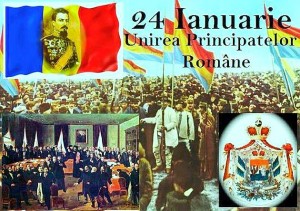On January 24, 1859 occurred Small Union – Union of the Romanian Principalities under the leadership of Alexandru Ioan Cuza. Small Union in 1859 was the first step towards accomplishment Romanian national state.
 The union of the two principalities was a process that began in 1848, based on strong economic and cultural proximity between the two countries. 1848 was achieved customs union between Moldova and the Romanian Country, during the reigns of Mihail Sturdza, respectively Gheorghe Bibescu.
The union of the two principalities was a process that began in 1848, based on strong economic and cultural proximity between the two countries. 1848 was achieved customs union between Moldova and the Romanian Country, during the reigns of Mihail Sturdza, respectively Gheorghe Bibescu.
In Moldova, Alexandru Ioan Cuza was elected ruler unanimously on January 5, 1859, the “National Party”, followed later in a secret meeting of the Assembly, deputy Vasile Boerescu proposed on January 24, 1859 election of Alexandru Ioan Cuza, It was accepted unanimously. That expired on January 24, 1859 was considered the Ottoman Empire and Austria as a violation of the Paris Convention, but the text of the 1858 Convention does not stipulate that the two principalities elected Messrs be separate persons.
In 1862, with the help of unionists in the two countries, Alexandru Ioan Cuza unified parliament and government, realizing the political unification, and after his removal from power in 1866, the union was strengthened by bringing to the throne Prince Carol of Hohenzollern-Sigmaringen. By the Constitution adopted on 1 July 1866, the United Principalities begin to officially nominate Romania for December 1, 1918 was accomplished the Great Union of Transylvania with Romania creating the current state.
Alexandru Ioan Cuza, executor union from January 24, 1859 descended from an ancient family of the Moldovan side of the jaw, family Clucerului, boards Commission, stewards. Cuza was born on 20 March 1820. He taught until 1831 in Iasi, where he had some of his future colleagues collaborators, among them Alecsandri. He is then sent to Paris, where he takes the baccalaureate in letters. He then returned home and joined the army. He married in 1844 with Elena Rosetti. The reign of Alexandru Ioan Cuza during the events of 1848 Cuza was at the forefront. He spoke at the meeting in the hotel “Petersburg” in Iaşi, demanding implementation of democratic reforms. Among the rulers of the congregation arrested on the orders of Prince Mihail Sturdza was found and Cuza; then he managed to escape and flee under guard in Transylvania. Cuza has the opportunity to participate in the Grand Assembly of Blaj on 3/15 May 1848, after withdrawing Region. During the reign of Grigore Ghica was returned home and during the preparation of the Union, employed as chief magistrate of Galati. As a form of protest against the rigged elections for ad hoc meetings of Moldova, Cuza and resigned from the post of chief magistrate. Patriot with liberal ideas, but not radical, Cuza was accepted even by the supporters of the two candidates supported by conservatives who Sturza. On 5 January 1859 he was elected by unanimous vote of the deputies present in Moldova.
 The reign of Alexandru Ioan Cuza, although short (1859-1866), was the period of maximum development of modern Romania. By recognizing the full Union, creating the first Parliament of Romania and the first single unity government through his reforms: adoption of the first Romanian Constitution, electoral reform, land reform, education, the reign of Alexandru Ioan Cuza founded the modern development of Romania.
The reign of Alexandru Ioan Cuza, although short (1859-1866), was the period of maximum development of modern Romania. By recognizing the full Union, creating the first Parliament of Romania and the first single unity government through his reforms: adoption of the first Romanian Constitution, electoral reform, land reform, education, the reign of Alexandru Ioan Cuza founded the modern development of Romania.
The first step towards accomplishment Romanian national state was made on 24 January 1859 but the Great Union took place in 1918 in Alba Iulia.
